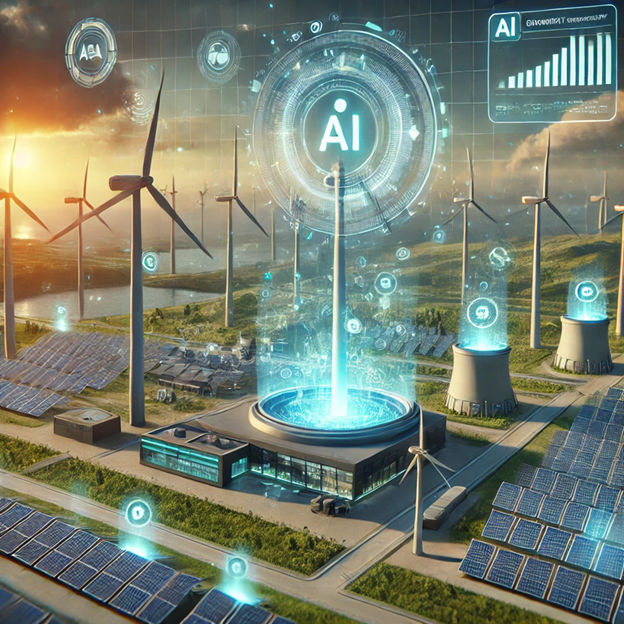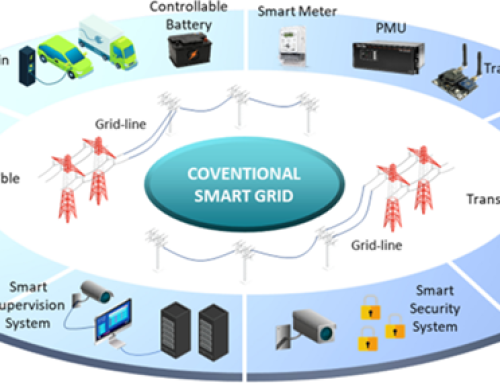The energy sector is undergoing a significant transformation. As the world shifts towards sustainable sources, managing renewable energy efficiently becomes crucial. Artificial Intelligence (AI) is playing a pivotal role in this transformation, helping utilities optimize operations, enhance customer experiences, and integrate various energy sources seamlessly. In this blog, we will explore how AI is revolutionizing renewable energy management and how e-365.ai is at the forefront of this change.
Enhancing Renewable Energy Integration
Renewable energy sources like solar, wind, and hydro are becoming increasingly important. However, integrating these sources into the existing energy grid can be challenging due to their variable nature. AI helps in predicting energy production from these sources by analyzing weather patterns, historical data, and real-time information. This accurate forecasting ensures that energy supply meets demand, reducing waste and increasing efficiency.
For example, solar power generation depends heavily on sunlight availability. AI algorithms can predict solar energy production by analyzing cloud cover, temperature, and other weather-related factors. Similarly, wind energy production can be forecasted by assessing wind speed and direction. These predictions enable utilities to balance energy loads effectively and maintain a stable energy supply.
Optimizing Grid Management
Managing an energy grid that includes multiple renewable sources requires advanced tools and strategies. AI-powered solutions can monitor and control grid operations in real-time, ensuring that energy flows smoothly and efficiently. By analyzing data from various grid components, AI can detect potential issues before they become significant problems, such as equipment failures or energy shortages.
e-365.ai specializes in AI-powered grid management solutions that integrate with existing systems like Microsoft Dynamics 365. This integration allows for centralized data analysis and better decision-making. Utilities can optimize their grid operations, reduce downtime, and enhance the reliability of energy supply to customers.
Improving Energy Forecasting
Accurate energy forecasting is essential for effective renewable energy management. AI enhances forecasting by processing vast amounts of data from different sources, including weather forecasts, energy consumption patterns, and production data. This comprehensive analysis provides utilities with reliable predictions of energy generation and consumption.
With e-365.ai’s Energy Planning module, utilities can leverage Azure Machine Learning AI to forecast power production. By analyzing production, distribution, consumption, price, and weather data, the system predicts future energy trends. These insights help utilities optimize their energy generation mix, ensuring that they can meet demand while maximizing the use of renewable sources.
Enhancing Outage Management
Power outages can disrupt both residential and commercial activities, leading to significant inconveniences and economic losses. AI plays a crucial role in managing and minimizing outages by providing detailed insights into grid health. AI-powered tools can detect outages in real-time, locate faults accurately, and manage switching controls to restore power quickly.
e-365.ai integrates grid management tools with Microsoft Dynamics 365’s Advanced Asset Management module. This integration allows for faster and more accurate outage management. Automated workflows dispatch maintenance teams promptly and communicate updates to customers efficiently. As a result, utilities can reduce outage durations, improve grid resilience, and enhance customer satisfaction.
Boosting Energy Efficiency
Energy efficiency is a key goal for utilities aiming to reduce costs and environmental impact. AI helps achieve this by analyzing energy consumption patterns and identifying areas where energy usage can be optimized. By implementing AI-driven strategies, utilities can reduce waste, lower operational costs, and promote sustainable energy use.
For instance, AI can analyze data from smart meters to understand how energy is consumed in different sectors. This analysis allows utilities to implement demand response programs, encouraging customers to shift their energy usage to off-peak times. Such initiatives not only balance the load on the grid but also reduce the need for additional energy production, leading to greater overall efficiency.
Supporting Smart Grids
Smart grids are advanced energy networks that use digital technology to manage electricity flow more effectively. AI is a fundamental component of smart grids, enabling real-time monitoring, automated control, and predictive maintenance. These capabilities make smart grids more responsive, reliable, and efficient.
e-365.ai’s solutions integrate AI with smart grid technologies, providing utilities with the tools needed to manage complex energy systems. By leveraging Microsoft Dynamics 365 and other AI technologies, e-365.ai helps utilities implement smart grids that can adapt to changing energy demands and integrate diverse renewable energy sources seamlessly.
Enhancing Customer Experience
Customer satisfaction is essential for utilities to maintain a positive reputation and build long-term relationships. AI enhances the customer experience by providing personalized services, improving communication, and ensuring reliable energy supply.
e-365.ai leverages AI to enhance customer interactions through advanced CRM systems integrated with Microsoft Dynamics 365. This integration allows utilities to offer tailored services, respond to customer inquiries promptly, and provide real-time updates on energy supply and outages. By improving these aspects, utilities can increase customer satisfaction and loyalty.
Streamlining ERP Integration
Effective management of resources is crucial for utilities to operate efficiently. Enterprise Resource Planning (ERP) systems play a significant role in this by integrating various business processes into a single platform. AI enhances ERP integration systems by automating routine tasks, providing real-time insights, and improving decision-making.
e-365.ai integrates ERP systems with AI technologies to streamline operations for utilities. This integration enables better resource allocation, efficient project management, and improved financial planning. By leveraging AI within ERP systems, utilities can achieve higher levels of operational efficiency and productivity.
Driving Innovation in Renewable Energy
Innovation is essential for the continuous improvement of the energy sector. AI drives innovation by enabling the development of new technologies and solutions that address the evolving challenges of renewable energy management. From advanced forecasting models to smart grid technologies, AI fosters creativity and progress in the industry.
e-365.ai is committed to driving innovation in the energy sector. By combining Microsoft Dynamics 365 with cutting-edge AI technologies, e-365.ai provides utilities with the tools they need to stay ahead in a rapidly changing landscape. This commitment to innovation ensures that utilities can adapt to new challenges and seize emerging opportunities in renewable energy management.
Conclusion
Artificial Intelligence is revolutionizing the energy sector, particularly in the management of renewable energy sources. By enhancing integration, optimizing grid management, improving forecasting, and boosting efficiency, AI enables utilities to operate more effectively and sustainably. e-365.ai is at the forefront of this transformation, offering AI-powered solutions that help utilities navigate the complexities of renewable energy management.
If you’re looking to innovate and enhance your utility operations with AI, e-365.ai is here to help. Visit e-365.ai today to learn more about how our solutions can transform your energy management strategies.






Leave A Comment